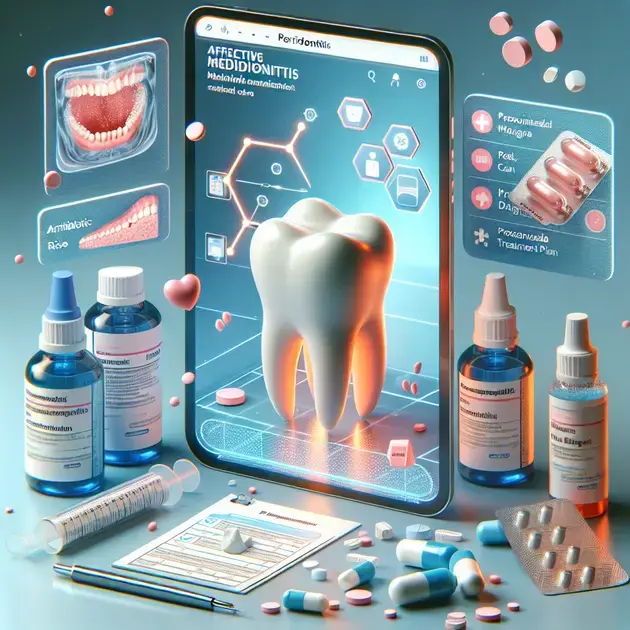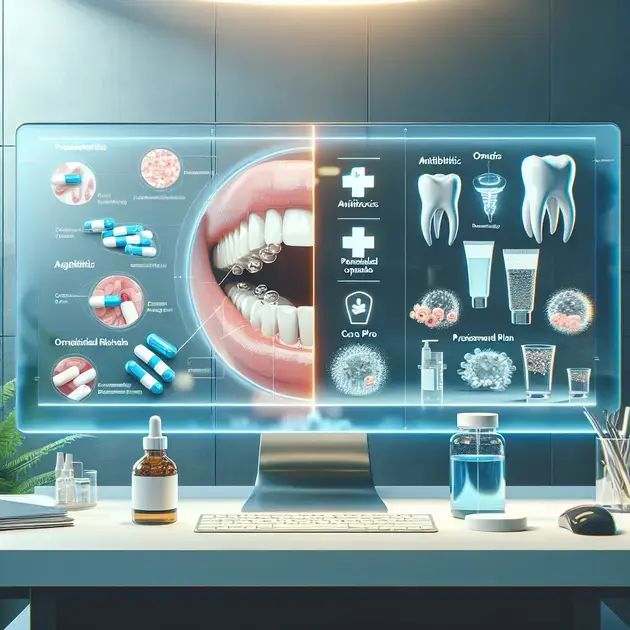Are you struggling with periodontitis and wondering about the most effective medication available? Look no further, as this comprehensive guide will provide you with all the information you need to understand and combat this oral health issue effectively.
Periodontitis is a serious gum infection that damages the soft tissue and destroys the bone that supports your teeth. In this guide, we will delve into the different medications that have been proven to be highly effective in treating periodontitis and restoring oral health.

Understanding Periodontitis: Symptoms and Causes
Periodontitis is a serious gum infection that damages the soft tissue and destroys the bone that supports your teeth. If left untreated, it can lead to tooth loss and other health complications. The main cause of periodontitis is plaque, a sticky film of bacteria that constantly forms on your teeth. Other factors that can increase the risk of periodontitis include smoking, hormonal changes, certain illnesses, and genetic predisposition.
Common symptoms of periodontitis include swollen or bleeding gums, persistent bad breath, receding gums, loose teeth, and changes in the way your teeth fit together when you bite. If you experience any of these symptoms, it’s important to see a dentist for a proper diagnosis and treatment plan.
To prevent periodontitis, it’s essential to maintain good oral hygiene practices, such as brushing your teeth twice a day, flossing daily, and getting regular dental check-ups. In addition, avoiding tobacco products and eating a healthy diet can also help reduce your risk of developing periodontitis.
For more detailed information on the symptoms and causes of periodontitis, you can visit reputable websites such as the American Academy of Periodontology or the Mayo Clinic.
Effective Medication Options for Periodontitis Treatment
There are several medication options available for the treatment of periodontitis, depending on the severity of the infection. Antibiotics, such as doxycycline and metronidazole, may be prescribed to help control the bacteria causing the infection and reduce inflammation in the gums.
In addition to antibiotics, your dentist may recommend using antiseptic mouthwashes containing chlorhexidine to help reduce plaque and prevent further infection. These mouthwashes are usually used in conjunction with regular brushing and flossing to improve oral hygiene.
In more severe cases of periodontitis, your dentist may perform scaling and root planing procedures to remove plaque and tartar buildup from the teeth and root surfaces. This deep cleaning treatment can help reduce inflammation and promote healing of the gums.
It’s important to follow your dentist’s instructions carefully when using medication for periodontitis treatment, including the dosage and administration guidelines. Be sure to ask any questions you may have about the medication and how to use it effectively for the best results.
Dosage and Administration Guidelines: How to Use Medication for Periodontitis
When using medication for periodontitis treatment, it’s crucial to follow the dosage and administration guidelines provided by your dentist or healthcare provider. This typically involves taking the medication as prescribed, at specific times of the day, and for a specified duration of treatment.
If you are prescribed antibiotics for periodontitis, make sure to finish the entire course of medication, even if your symptoms improve before the treatment is complete. Failing to complete the full course of antibiotics can lead to antibiotic resistance and may not fully eradicate the infection.
For antiseptic mouthwashes, follow the instructions on the label for how long to rinse your mouth and how frequently to use the mouthwash. Typically, you will use the mouthwash after brushing and flossing your teeth, swishing it around your mouth for a specified amount of time before spitting it out.
If you undergo scaling and root planing procedures, your dentist will provide post-treatment care instructions to ensure proper healing and prevent infection. This may include using a special mouthwash or applying a topical gel to the treated areas for a certain period of time.
It’s essential to communicate with your healthcare provider if you have any questions or concerns about the dosage and administration of medication for periodontitis. Your provider can offer guidance and support to help you effectively manage your treatment plan and improve your oral health.

Effective Medication Options for Periodontitis Treatment Explained
Periodontitis is a serious gum infection that damages the soft tissue and destroys the bone that supports your teeth. It can lead to tooth loss if left untreated. While proper oral hygiene is crucial in managing periodontitis, medication can also play a key role in treatment. Understanding the effective medication options available can help improve the outcomes of periodontitis therapy.
One common medication used in periodontitis treatment is antibiotics. These can be prescribed in various forms, such as pills, mouth rinses, or gels. Antibiotics help to eliminate the bacteria causing the infection and reduce inflammation in the gums. They are often used in conjunction with other treatments, such as deep cleaning procedures.
Another effective medication option is antimicrobial mouth rinses. These rinses contain active ingredients that target and kill harmful bacteria in the mouth. Using an antimicrobial mouth rinse as part of your daily oral hygiene routine can help control the progression of periodontitis and prevent further damage to your gums and teeth.
In some cases, a dentist may recommend the use of antiseptic chips or gels. These are placed directly into the pockets of infected gum tissue and slowly release medication to fight off bacteria. Antiseptic chips and gels can be a targeted and effective way to deliver medication directly to the source of the infection.
Overall, the combination of proper oral hygiene practices and effective medication options can significantly improve the treatment outcomes for periodontitis. It is important to follow your dentist’s recommendations and adhere to the prescribed medication regimen for optimal results.
Maximizing the Benefits of Medication in Periodontitis Therapy
When it comes to managing periodontitis, maximizing the benefits of medication is essential for successful treatment. Medication plays a crucial role in controlling the infection, reducing inflammation, and promoting healing in the gums and bone. By understanding how to make the most of your medication, you can improve the efficacy of your periodontitis therapy.
One key aspect of maximizing medication benefits is consistency. It is important to take your medication as prescribed by your dentist or healthcare provider. Skipping doses or not following the recommended dosage can hinder the effectiveness of the medication and prolong the treatment process.
Additionally, combining medication with proper oral hygiene practices can enhance the benefits of treatment. Brushing and flossing regularly, using antimicrobial mouth rinses, and attending regular dental cleanings can help maintain a healthy oral environment and support the effects of the medication.
Monitoring your progress and communicating with your dentist are also important steps in maximizing medication benefits. Be sure to attend follow-up appointments as recommended and inform your dentist of any changes or concerns during treatment. Your dentist can adjust your medication regimen if needed to optimize the outcomes of your periodontitis therapy.
By following these guidelines and working closely with your dental care team, you can maximize the benefits of medication in your periodontitis therapy and improve the overall health of your gums and teeth.
Personalized Treatment Plans for Optimal Periodontitis Management
Each individual’s experience with periodontitis is unique, and a one-size-fits-all approach to treatment may not be effective. Personalized treatment plans tailored to your specific needs and circumstances can offer optimal management of periodontitis and improved outcomes.
When developing a personalized treatment plan for periodontitis, your dentist will take into account factors such as the severity of the infection, your overall health, and any underlying conditions you may have. This comprehensive assessment allows for targeted interventions that address your specific concerns and promote healing in the affected areas.
In addition to medication, personalized treatment plans may include a combination of therapies such as scaling and root planing, laser therapy, or surgical interventions. These treatments are selected based on your individual needs and goals for periodontitis management.
Regular monitoring and adjustments to your treatment plan are also important for optimal periodontitis management. Your dentist will track your progress, assess the effectiveness of the current interventions, and make any necessary modifications to ensure the best possible outcomes.
By working collaboratively with your dental care team and following a personalized treatment plan, you can take proactive steps towards optimal periodontitis management and maintain a healthy smile for years to come.
Conclusion
Effective medication plays a crucial role in the treatment of periodontitis, a serious gum infection that can lead to tooth loss if left untreated. Antibiotics, antimicrobial mouth rinses, and antiseptic chips are among the medication options that help eliminate bacteria, reduce inflammation, and promote healing in the gums and bone. When combined with proper oral hygiene practices, these medications can significantly improve the outcomes of periodontitis therapy.
Maximizing the benefits of medication is essential for successful treatment. Consistency in taking prescribed medication, along with maintaining good oral hygiene habits, can enhance the effectiveness of treatment. Monitoring progress, attending follow-up appointments, and communicating with your dentist are vital steps in optimizing medication benefits and achieving optimal results in periodontitis therapy.
Personalized treatment plans tailored to individual needs and circumstances offer the best approach to managing periodontitis. Factors such as the severity of the infection, overall health, and specific concerns are taken into account when developing these plans. Alongside medication, therapies like scaling and root planing, laser therapy, and surgical interventions are included based on individual requirements for effective periodontitis management.



